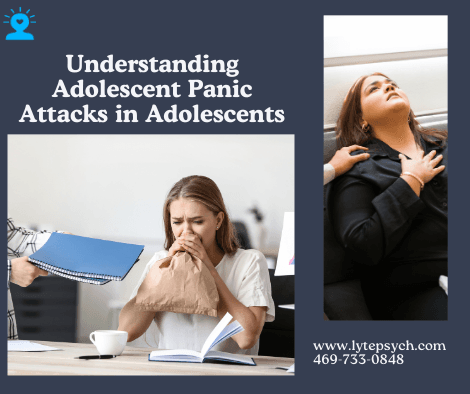Tue Jun 04 2024
Panic Attacks in Adolescents: (A Guide for Parents to Understand Changes in Behavior in Adolescents) at Lyte Psychiaty (Best Psychiatrists and Therapists Near You), Affordable Therapists and Psychiatrist Near You, Dallas, Fort Worth, TX

Panic Attacks in Adolescents: Signs, Symptoms, and Solutions at Lyte Psychiatry (Affordable Therapists and Psychiatrist Near You), Dallas, Fort Worth, TX
Panic disorder is a common and treatable disorder. Children and adolescents with panic disorder have unexpected and repeated times of intense fear or discomfort, along with other symptoms such as a racing heartbeat or feeling short of breath. These periods are called "panic attacks" and last minutes to hours
For some adolescents, this period of life can also bring about unexpected and overwhelming feelings of panic. Recognizing the signs, symptoms, and solutions for panic attacks in adolescents is crucial for providing support and guidance during these turbulent times.
Understanding Panic Attacks in Adolescents
Panic attacks are intense episodes of fear and discomfort that often come on suddenly and without warning. While they can happen to anyone, adolescents may be particularly susceptible due to the myriad of changes they're experiencing physically, emotionally, and socially. Understanding the signs and symptoms can help distinguish panic attacks from typical teenage angst.
Signs and Symptoms of Panic Attacks in Adolescents
Physical Symptoms:
Adolescents experiencing a panic attack may exhibit physical symptoms such as rapid heartbeat, sweating, trembling or shaking, shortness of breath, chest pain or discomfort, dizziness, and nausea. These physical sensations can be distressing and may lead the individual to believe they are having a heart attack or other serious medical condition.
Emotional Symptoms:
Along side physical symptoms, adolescents may also experience intense feelings of fear, apprehension, or impending doom during a panic attack. These emotions can be overwhelming and may lead to a sense of detachment from reality.
Behavioral Symptoms:
Adolescents may exhibit avoidance behaviors, such as avoiding places or situations where they have previously experienced a panic attack. This can lead to social withdrawal and isolation, further exacerbating feelings of anxiety and fear.
Solutions and Support Near You at Lyte Psychiatry
Seek Professional Help: If you suspect that your adolescent is experiencing panic attacks, it's essential to seek professional help from a qualified mental health professional. A therapist or counselor can provide strategies for managing anxiety and coping with panic attacks.
Encourage Open Communication: Create a safe and supportive environment for your adolescent to express their feelings and concerns. Encourage open communication and reassure them that they are not alone in their struggles.
Teach Coping Strategies: Help your adolescent develop coping strategies for managing stress and anxiety. This may include deep breathing exercises, mindfulness meditation, progressive muscle relaxation, or engaging in activities they enjoy.
Promote Healthy Lifestyle H-a-bits: Encourage your adolescent to prioritize self-care activities such as regular exercise, healthy eating, adequate sleep, and limiting caffeine and alcohol intake. These lifestyle habits can help reduce stress and promote overall well-being.
Foster a Supportive Network: Connect your adolescent with supportive friends, family members, or peer support groups. Having a strong support network can provide validation, understanding, and encouragement during difficult times.
Seek for Professional Help with Lyte Psychiatry (Best Adults and Adolescents Psychiatrist and Therapist)
By understanding the signs, symptoms, and solutions for panic attacks, parents, caregivers, and educators can play a crucial role in supporting adolescents through these challenging experiences.
To Schedule an appointment. Click Here
To see our services. Click Here
Call us if you have questions at 469-733-0848
FAQ
Q: What are the first steps to take if my adolescent is experiencing a panic attack?
A: Remain calm and reassure your adolescent. Encourage slow, deep breathing and help them find a quiet space to relax. Seek professional help if panic attacks persist.
Q: Can lifestyle changes really make a difference in managing panic attacks?
A: Yes, healthy lifestyle habits such as regular exercise, balanced nutrition, adequate sleep, and avoiding caffeine can significantly reduce anxiety and improve overall well-being.
Q: How can I support my adolescent if they are avoiding social situations due to panic attacks?
A: Encourage gradual exposure to social situations with supportive friends or family members. Professional therapy can also provide strategies to manage avoidance behaviors.
Q: What type of professional should we see for panic attacks?
A: A licensed therapist, counselor, or psychiatrist who specializes in anxiety disorders and adolescent mental health is best equipped to provide treatment for panic attacks.
Q: How can Lyte Psychiatry help my adolescent?
A: At Lyte Psychiatry, our team of experienced professionals offers personalized treatment plans, including therapy and medication management, to help adolescents manage panic attacks and lead healthier lives.